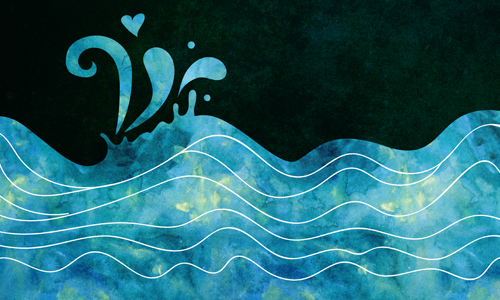Life isn’t normal. New disruptions to all aspects of our lives have become the only normal that we can expect.
A few weeks ago, as more and more of the coronavirus craziness began to hit home, I was thinking that at least I didn’t have to worry about one thing: going to the mikvah. For the last several months, I hadn’t had my menstrual period. My doctor assured me that this was the beginning of a peri-menopausal state and was quite normal.
In Judaism, the laws of mikvah are sacrosanct; they are the basis and foundation for establishing a JewishThere are many benefits to this system of living home. During the time that a woman has her period and for seven days thereafter, the couple abstains from physical intimacy. At the conclusion of this time, the woman immerses in a mikvah and the couple once again join together in physical unity.
There are many benefits to this system of living, and countless couples enthuse how the tradition has reignited the spark and passion of their married lives. In fact, nowadays, mikvahs have become so popular that many Jewish women who don’t consider themselves “religious” or “observant” per se enjoy the practice and eagerly immerse in the beautiful, spa-like modern facilities.
That is, until coronavirus turned our lives topsy-turvy.
Due to the horrific spread of the virus, the mere thought of stepping out of our homes has become full of fear. So I was happy that I wouldn’t need to think about the prospect of going to a mikvah at least for the next little while. Until last week, when all of a sudden, I once again got my period.
I was now in the same boat as thousands of fellow sisters worldwide. I had heard that many women were reluctant to immerse at this time. There were discussions on Facebook groups expressing women’s fear and uncertainty; there was a lot of confusion and even panic. Some asked whether under such circumstances this was still necessary? In some locations, I heard that the woman’s mikvah had to be closed. I knew that the laws of mikvah are still relevant even during pressing circumstances, and this meant that the couple would have the hardship of abstaining from physical intimacy until their facilities would once again be reopened.
I was in a dilemma. Do I put myself at risk? Do I put my family at risk? On the other hand, I was well aware that this mitzvah is so essential to family life that building a mikvah takes precedence over building a synagogue. In fact, a Torah scroll—our most holy possession as a nation—can even be sold if that’s what’s needed to fund a mikvah. That’s how essential the Torah considers this precious mitzvah.
The word mitzvah means commandment, but it also means connection. Every mitzvah that we do connects us to our Creator. Every mitzvah also opens up spiritual channels and provides us with spiritual protection and blessing. In this dire time, I felt that my family and I could use all the protection and blessings we could get!
I thought, too, of the self-sacrifice that my ancestors went through to fulfill this precious mitzvah throughout the generations. My own grandmother had to break through the ice of a river in Russia to immerse. I remember touring Masada and incredulously seeing the mikvah that was built even in duress, when the Jewish people were under siege.
I decided to approach the dilemma in a level-headed manner. I would do some research.
I called the rebbetzin of my city to ask her what precautions she was taking. She told me that there was a list of specific protocols established by rabbis in conjunction with the CDC and local health department to ensure absolute safety. She told me that every woman was screened before being allowed to immerse, and that if a woman has any symptoms, she may not immerse so asI felt reassured and scheduled an appointment not to put anyone else at risk. Specific precautions were also made in the actual mikvah preparatory rooms, and that the waters are disinfected and tested before each woman enters.
I was feeling better about this.
I still decided to call a longtime friend of my family, a prominent family physician and Torah-observant woman in Toronto. I was fortunate that she answered her cell phone, as she was clearly on her way to attending to several of her ill patients. Her voice sounded strained, but she was kind enough to give me a few minutes of her time. She explained that the protocol she and others had instituted in Toronto made them safe to use (they sounded very similar to those of the mikvah in my city here in the United States). She also clarified that the waters were not at risk since they were treated with chemicals to kill the virus. The risk was more about the surfaces in the preparation rooms; that’s why they had put into place extra regulations and instructions. Also, the attendant was careful not to come close to anyone immersing.
Once I had these facts, I knew this was something I wanted to do—for myself, for my relationship with my husband and for my relationship with G‑d.
In Judaism, many metaphors describe our relationship with G‑d, but the two most prominent ones are G‑d as a parent and G‑d as a spouse. While both are loving relationships, the type of love is very different.
The love of a parent to their child is instinctive; it’s inborn and therefore, to an extent, remains constant and stagnant. Though the relationship grows and develops, the love is ever-present and continuous. On the other hand, the love of spouses is not innate, but created. It’s a love that passionately surges like a fire and continuously grows as two separate beings from two separate backgrounds become united. Yet there’s also great tension, and it is precisely this tension—and even the times when the relationship falters—that creates the ultimate strength of the bond. A couple that has survived a crisis in their relationship (whether small or big) is never the same; the relationship will either break or become exponentially strengthened, specifically due to overcoming difficulty together.
The times of separation and then coming together in a Jewish couple’s life, as regulated by the laws of family purity, resemble the ups and downs in our lives. The times of distance and separation are meant to ignite our desire to grow together in a greater bond. Similarly, the lows or challenges we encounter in life are meant to help us develop into greater human beings.
Metaphorically, these times of separation are also compared to galut (“exile”), when the Jewish people do not feel the close embrace of G‑d’s presence in our lives. Ultimately, these times lead us to the final redemption when the union of the Jewish people with our supernal Groom will be complete, and the fiery love and connection will become so strong that it is unbreakable.
The halachic term used for when a couple cannot have physical intimacy is niddah. Hidden within this word is a message for every one of us as we endure times of challenge. Niddah comprises two Hebrew words, nod hashem, which means “G‑d wanders.” G‑d is teaching us that during our times of imposed separation and distance—when we do not feel the warmth, clarity and beauty of His company—we should never feel that we are alone, but He is here, together with us.
We can never fathom the meaning or need for suffering in this world, and we are never meant to, for if we understood human suffering, we would justify it and thus be a part of the problem. But G‑d does assure us that even in hard times we should never believe He is distant—that He doesn’t hear our cries or our pain. He is wandering with us, holding our hand during our galut trek, walking at our side, and giving us the strength to continue. He is with us, hearing our cries and wiping away our tears.
Now more than ever, as we confront the ravages of this terrible virus that has caused so much sickness, suffering and death—and that has disrupted our lives in ways that we could never have imagined—I want to feel that embrace from G‑d. As our world spins into such uncertainty, and fear and sometimes even panic overtake us, I want to feel the waters of the mikvah hugging me, assuring me that though I don’t understand what’s going on around me, G‑d is right here with me, helping me overcome.


